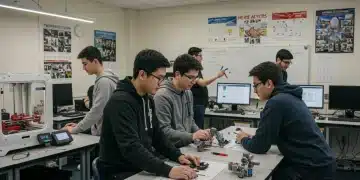US tech industry insights trends: what to expect in 2024

Anúncios
The future of tech employment in the US will focus on high demand for skills in artificial intelligence and data analysis, with opportunities for remote work and emerging roles that require both technical and soft skills.
US tech industry insights trends are setting the stage for exciting changes in technology and innovation. Have you wondered how these trends might affect your business or everyday life? Let’s dive into the key developments shaping the future.
Anúncios
Current trends in the US tech industry
The current trends in the US tech industry reveal fascinating developments that are transforming our world. Technology evolves rapidly, and understanding these shifts is crucial for anyone interested in the future.
One significant trend is the rise of artificial intelligence. This technology is not just a buzzword; it’s changing how companies operate. Businesses are harnessing AI for data analysis, customer service, and even product development. By integrating AI, companies can improve efficiency and create personalized experiences.
Anúncios
Cloud Computing Growth
Another important trend is the expansion of cloud computing. As more businesses move their operations online, the demand for cloud services grows. This shift allows for greater flexibility and scalability, making it easier for companies to adapt to changes.
- Increased data storage capacity
- Enhanced security measures
- Collaboration tools for remote work
Moreover, cybersecurity remains a top priority as technology evolves. With more data stored online, protecting that information is essential. Companies are investing in new security protocols to safeguard against breaches.
Remote Work Technologies
The COVID-19 pandemic accelerated the adoption of remote work technologies. Tools like video conferencing and project management software are now standard. This trend is likely to continue as companies recognize the benefits of flexible work arrangements.
- Improved work-life balance
- Access to a broader talent pool
- Cost savings on office space
In addition to these trends, the emphasis on sustainability is increasing. Tech companies are seeking to minimize their environmental impact by adopting green practices. This includes using renewable energy sources and creating energy-efficient products.
As we look ahead, the intersection of these trends will shape the tech landscape in the coming years. Staying informed about these developments can help individuals and businesses navigate this ever-changing environment effectively.
Impact of AI on US technology

The impact of AI on US technology is profound and far-reaching. As artificial intelligence becomes more integrated into various industries, it transforms how businesses operate and interact with consumers.
AI is enhancing productivity in significant ways. Companies are using machine learning algorithms to analyze large datasets swiftly, leading to smarter decision-making. These tools help businesses to tailor their services, improving customer experiences. This means consumers often receive personalized recommendations and services based on their preferences.
Automation in Various Sectors
Another crucial area is automation. AI technologies are taking over repetitive tasks. This shift allows human workers to focus on more complex activities, fostering creativity and innovation.
- In manufacturing, robots perform assembly line tasks faster and with precision.
- In retail, AI chatbots handle customer queries efficiently.
- In healthcare, machine learning models assist in diagnosing diseases more accurately.
This automation leads to increased efficiency across multiple sectors, fundamentally changing job roles and expectations. While some jobs may be lost, new opportunities arise that require a different skill set. Workers need to upskill to remain relevant in the evolving job market.
Data-Driven Decisions
Furthermore, AI empowers companies to make data-driven decisions. With continuous data analysis, businesses can quickly adapt to market trends. This agility is vital in today’s fast-paced environment.
Moreover, the integration of AI systems into customer relationship management (CRM) tools enhances marketing efforts. Companies leverage these insights to craft targeted campaigns that resonate with their audiences. The results often include increased engagement and higher conversion rates.
As AI technologies advance, ethical considerations also come into play. Companies must ensure that AI systems are developed responsibly. The focus should be on transparency and fairness, minimizing biases in AI algorithms to boost trust among users.
The ongoing evolution of AI will undoubtedly continue to shape the technology landscape in the US and across the globe. Understanding its impact is essential for businesses aiming to navigate this future
Emerging startups to watch
Emerging startups to watch are reshaping the technology landscape in the US. These innovative companies bring fresh ideas and dynamic solutions, driving change across various sectors.
One standout in the startup scene is a company focused on health technology. They are developing platforms that leverage AI to enhance patient care. By using data analytics, they can streamline processes in hospitals, making healthcare more efficient.
Innovation in Fintech
Another exciting area is financial technology, or fintech. Startups in this space are simplifying banking and investment experiences. They offer user-friendly apps that help individuals manage their finances better, democratizing access to financial tools.
- Instant mobile payments
- Automated investment platforms
- Personal finance tracking
Additionally, there is a surge in green technology startups. These companies are dedicated to solving environmental challenges through innovation. They create products and services that promote sustainability and reduce carbon footprints.
Focus on AI and Machine Learning
Startups specializing in AI and machine learning are also gaining traction. They provide advanced solutions for businesses to analyze data and automate tasks, which helps in improving productivity.
This approach not only saves time but also enhances decision-making. For example, companies are increasingly using AI to predict market trends, allowing them to stay competitive.
In the evolving startup ecosystem, keeping an eye on these companies is essential for understanding where technology is heading. They often serve as indicators of broader shifts in consumer preferences and market demands, ultimately shaping the future of the tech industry.
Future of tech employment in the US

The future of tech employment in the US is an exciting topic that demands attention. As technology continues to evolve, so do the job opportunities within the industry.
One major trend is the increasing demand for skilled workers in areas like artificial intelligence and data analysis. Companies need professionals who can create and manage AI systems or analyze data to drive business decisions. This demand is likely to grow as AI becomes more integrated into everyday operations.
Emerging Job Roles
Some emerging job roles include AI ethics consultants and machine learning engineers. This reflects a shift in focus towards ensuring ethical practices in technology. As companies deploy more algorithms, they require experts to safeguard against biases and ensure fairness.
- AI and machine learning specialists
- Cybersecurity analysts
- Data scientists
In addition to technical skills, soft skills are becoming increasingly important. Employers are seeking candidates who can communicate effectively and collaborate within teams. The ability to adapt to new technologies and learn quickly is essential in this fast-paced environment.
Remote Work Opportunities
Another vital aspect of the future of tech jobs is the rise of remote work. The pandemic has shown that many tech roles can be performed from anywhere. This shift opens up the job market significantly, allowing companies to hire talent from diverse locations.
As a result, competition for talent will be fierce. Companies must develop attractive work environments and benefits to draw in skilled workers. This includes offering flexible schedules and opportunities for professional development.
Overall, as the demand for tech skills grows, the landscape of employment will transform. By preparing for these changes, workers can position themselves for success in the future of the tech industry.
In conclusion, the future of tech employment in the US is bright and evolving rapidly. With the rise of artificial intelligence and data analysis, new job roles are emerging, demanding both technical and soft skills. The shift toward remote work allows companies to access a broader talent pool, making competition for skilled professionals even more intense. By staying informed and adapting to these changes, workers can prepare themselves for a successful career in the tech industry, shaping the landscape for future generations.
FAQ – Frequently Asked Questions about the Future of Tech Employment in the US
What skills are in high demand in the tech industry?
Skills in artificial intelligence, data analysis, and cybersecurity are highly sought after in the tech job market.
How is remote work affecting tech employment?
Remote work allows companies to hire talent from a wider geographical area, increasing competition for jobs.
What new job roles are emerging in the tech field?
Emerging roles include AI ethics consultants, machine learning engineers, and data scientists that focus on advanced technology applications.
How important are soft skills in tech jobs?
Soft skills, such as communication and adaptability, are becoming increasingly important as tech roles evolve and require collaboration.





